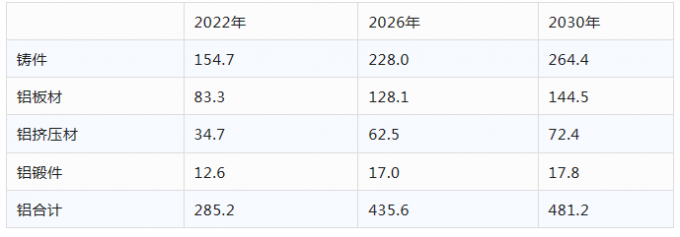Recently, the European Aluminum Association released the "Aluminum Content Research Evaluation and 2030 forecast Report for Passenger cars in Europe". The report was commissioned by consulting firm Ducker Carlisle. The latest study found that the average use of aluminium in cars in Europe increased by 18% from 174kg in 2019 to 205kg in 2022. The study predicts that this growth trend will continue, with the average aluminum content of passenger vehicles expected to increase from 205kg in 2022 to 237kg (+15.6%) in 2026, and aluminum usage per vehicle reaching 256kg (+24.9%) in 2030, which would be a net increase of 51.6kg over 2022.
According to the study, the automotive industry's lightweight and electrification trends are driving a significant increase in aluminum content. Electric vehicles in particular have made the most significant contribution to this growth, with the average battery electric vehicle (BEV) produced in Europe in 2022 containing 283kg of aluminium, compared with just 169kg for pure petrol or diesel ICE cars. Between 2022 and 2026, the average aluminum content of electric vehicles is expected to increase a further 9.5 percent to 310kg. The huge growth in the use of aluminium in pure electric vehicles is mainly due to its use in electric drive housings, battery pack housings, battery trays and cooling plates. In addition, aluminum plays a vital role in electric vehicle infrastructure, including power cables and charging stations. Aluminum's unique recyclability also ensures that aluminum used in today's automobiles can be recycled again and again after the car is scrapped.
Helene Wagnies, president of Ducker Carlisle, said: "Our latest assessment reinforces the critical role of aluminium in weight reduction. As powertrain electrification accelerates, the need to reduce weight to offset battery weight increases significantly, and so does the amount of aluminum in cars. In addition to specific components for electric vehicles, the implementation of large and jumbo castings in vehicle body structures will also strongly promote greater aluminum consumption. With the EU's ambitious target to reduce CO2 emissions from vehicles by 55% by 2030, aluminium will continue to play a key role in vehicle manufacturers' material portfolios to achieve the SDGS and will show growth in all product forms, including aluminium extrusions, plates, castings and forgings."
In 2022, the average amount of aluminum used in passenger cars in Europe was 205kg, including 123kg of aluminum castings, 45kg of aluminum plates, 27kg of aluminum extrusions, and 10kg of aluminum forgings. In 2030, it is predicted that aluminum castings will reach 155kg, aluminum plates 59kg, aluminum extrusions 42kg, and aluminum forgings 10.5kg. The growth rate of passenger car profiles will be higher than that of aluminum castings.
According to the report, aluminum consumption in European passenger cars will reach 2.852 million tons in 2022, 4.356 million tons in 2026, and 4.812 million tons in 200.
2022-2026-2030 Aluminum for Passenger Cars in Europe (tons)
Florian Stadler, Chairman of the European Aluminium Association's Automotive and Transport Committee and Managing Director of AMAG's Calendering business, stressed the urgent need for EU policymakers to provide adequate support measures for the European aluminium industry in response to the growing demand. Due to the ongoing energy crisis and an uneven global playing field, Eurocan is currently facing increasing production losses, particularly in primary aluminium production.
Florian Stadler said: "Demand for aluminium is increasing rapidly as the automotive industry accelerates towards lightweight and electrification. To meet this surging demand, policy makers must act to ensure that sustainable aluminium, locally produced or recycled in Europe with a low CO2 footprint, is readily available to car manufacturers. This could reduce dependence on imported aluminium and meet Europe's Sustainable Development Goals. "
Ducker Carlisle's study covers all automotive manufacturers in the EU and the UK in 2022 and includes data from automotive Oems, suppliers and member companies of the European Aluminium Association. The research report is based on a detailed analysis of the use of aluminium castings, extrusions, forgings and plates in a 12-part series.
(www.profiles-aluminum.com; sales@profiles-aluminum.com).

